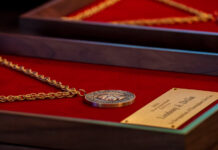Barnes, a University of Louisville philosophy professor, collects unused food from Belknap Campus kitchens and turns it into organic fertilizer. Battcher, a former Fulbright Scholar who created UofL’s first community garden, is leading an effort to recycle food waste from student residence halls.
So what’s all the fuss about saving food scraps?
“Composting is the right thing to do and the smart thing to do,” said Justin Mog, assistant to UofL’s provost for sustainability initiatives. “It keeps waste out of the landfill, produces free, high-quality organic fertilizer and helps you grow healthier plants.”
Yard clippings and food waste account for nearly a fourth of everything thrown away in American cities and towns, according to the U.S. Environmental Protection Agency.
Last year, UofL’s Physical Plant composted 180 tons of dead plant material but wasn’t set up to compost food, said UofL recycling coordinator Aaron Boggs. When Barnes learned of the gap, he organized a group of volunteers to start the effort in a Physical Plant lot off Floyd Street.
“There was no money, so I had to scavenge,” he said. “Luckily, the university had 10 garbage dumpsters that weren’t being used so we turned them into compost bins.”
Since July, Barnes and his volunteers have collected 29,000 pounds of pre-consumer food scraps and coffee grounds, mostly from the Student Activities Center and West Dining Hall. Barnes puts the waste in plastic buckets and bags and hauls it to the composting site every Sunday in his 1996 Volkswagen Jetta.
“My wife and I don’t use the car for anything else,” he said. “We’ve donated it to the composting effort.”
Barnes hopes to recruit more volunteers to work at the composting site Sunday afternoons. He can be reached at 502-338-1338 or bgbarn01@louisville.edu.
Battcher, who last year helped establish Garden Commons next to the Cultural Center on Belknap Campus, recently obtained a $13,500 grant from a private company to add food composting and other new features to the community-gardening initiative.
“We’ll put six to eight 90-gallon compost drums for food waste at the site and equip the student residence halls with five-gallon buckets,” Battcher said.
Students will be asked to put food waste from their rooms into the buckets, which will be emptied into the compost drums. Compost made through the project will be used as organic fertilizer for the garden, she said.



























